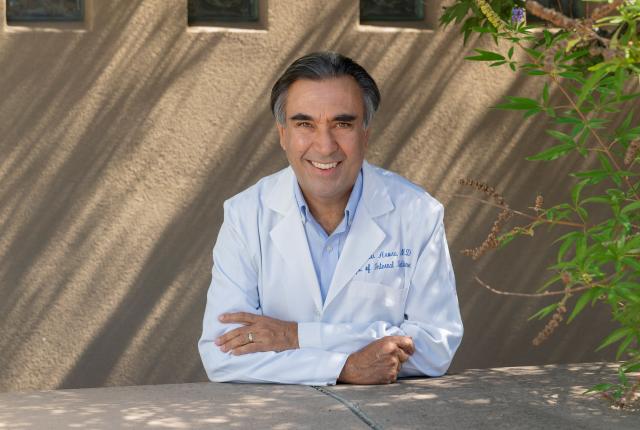ONE MORNING IN 2001, DR. SANJEEV ARORA entered his university clinic in Albuquerque to find a woman and her two children already waiting for him. The woman, who had been living with untreated hepatitis C for the last eight years, was experiencing intense abdominal pain. “Why didn’t you come earlier?” asked the gastroenterologist and University of New Mexico professor.
The single mother lived 200 miles away, and the regimen of injections needed to treat the viral infection required weekly appointments in Albuquerque that she could neither afford nor take time off work to attend. An ultrasound revealed late-stage liver cancer, which proved fatal just six months later. The lesson from that day changed the trajectory of Arora’s life—and the lives of millions of patients worldwide.
In 2003, Arora created Project ECHO (Extension for Community Healthcare Outcomes) to connect medical professionals—many in rural areas with little healthcare infrastructure—to discuss cases, exchange knowledge, and evaluate best practices around specialized treatments. With the motto “All teach, all learn,” the platform to share medical knowledge is inspired by the way clinicians learn during residencies.
“They’re real case studies,” Arora says. “It’s a back-and-forth exchange of information.” In this way, Project ECHO has become a powerful tool for improving patient care, not only in New Mexico, but across the globe. Since its founding, Project ECHO has reached 3.7 million healthcare providers across 193 countries in 70 disease areas. Thus, more patients can receive treatment in nearby hospitals, from their local physicians, rather than traveling to cities to see specialists.
Dr. Christopher Piromalli, a UNM palliative care physician who works at Project ECHO, has worn many hats in his career and was a family medicine resident in Alaska. There, patients often fly to Anchorage for specialized treatment, and villages may have little to no palliative care. “The only way that you can get to a number of the villages is by boat or plane,” Piromalli says. Project ECHO helped spread best practices throughout rural Alaska so patients living with cancer, kidney disease, or Alzheimer’s could receive local care and support. “What you learn from one case, you can now apply to the five or 10 people that you see down the road,” he says.
Arora grew up in India as the child of two physicians. His father worked for the World Health Organization, and his mother was an ob-gyn. “My mother built her own small hospital,” he says. “We lived on top of it.” Each day, Arora walked through the hospital and observed her work. “My mother never said no to anyone, whether they had money or not,” he says.
When the pandemic hit, Project ECHO became an important resource for doctors seeking advice on treating Covid-19. The project allowed them to quickly get new information on how to help infected patients. Both the Centers for Disease Control and the World Health Organization tapped into ECHO’s resources. “WHO used our platform for the entire African continent,” Arora says. A paper published in September by Cambridge University detailed Project ECHO’s vital role in the U.S. pandemic response, noting that clinicians who attended sessions on Covid treatment rated their knowledge after each session as significantly higher than before.
“We want to help one billion people by December 31, 2025,” Arora says. “We want to change the world.”
TRUE HEROES
Read more about the 10 individuals who went above and beyond to support our communities.


